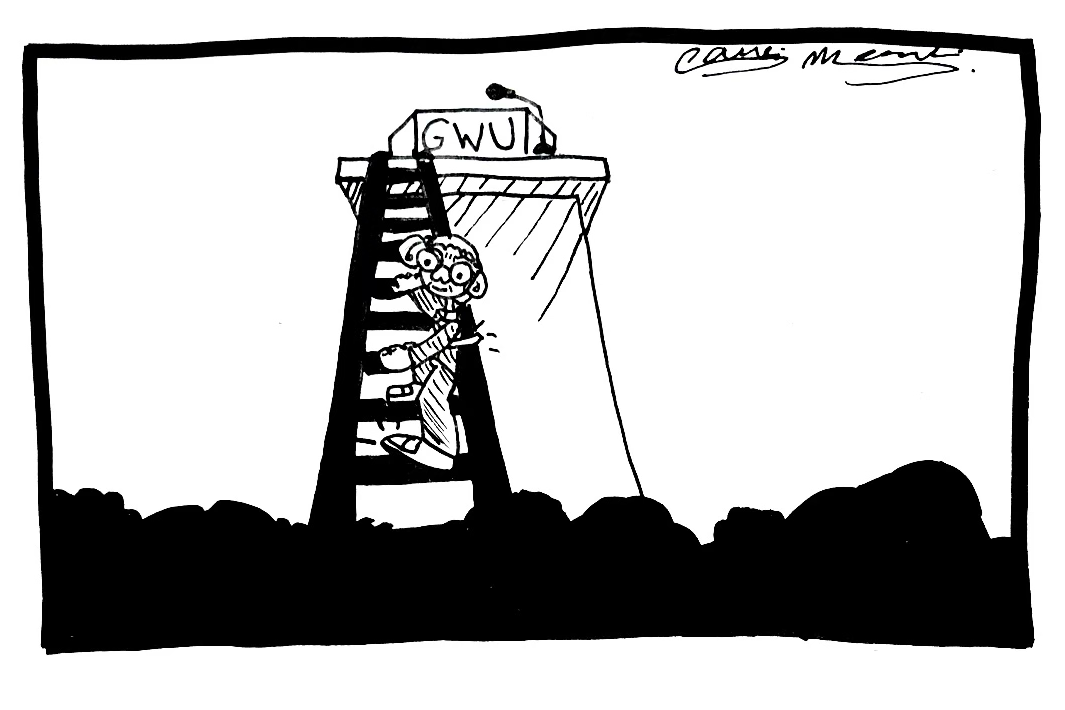My day started like most of my Sundays do. I got up, ate breakfast, started a load of laundry, went to a meeting and walked back to my room. By the time I got back to my room, I was greeted by an alarm and a voice echoing through the hall declaring a fire.
I sighed in annoyance but proceeded to make my way down 11 flights of stairs anyway. I walked outside and joined students who had been evacuated from the building and watched GW Police Department officers grow irritated at students who pestered them with questions about when they would be allowed back inside. About 20 minutes later, the alarm turned off and we were allowed back into the building.
I went back to my day as originally planned. I ate some lunch, put my laundry in the dryer and just as I sat down to do some work, the fire alarm went off again. This time, I wondered if I should even leave the building if the alarm was not a real emergency.
A fire went off in Thurston Hall last week, leaving several floors damaged from the water that flooded after it broke out. The evacuation was an emergency, but not all students consider these alarms urgent calls to leave a residence hall. Since the start of the semester, District House and Mitchell Hall have had four times as many fire alarm activations as other residence halls because of issues like cooking malfunctions or dust. Students often do not take fire alarms seriously because they are too frequent and the so-called emergencies are not really emergencies.
Students need real consequences for refusing to leave their rooms, and officials must ensure alarms only go off when something is truly wrong. GWPD officials must respond faster to these alarms, and the University should fine students who set off fire alarms several times to ensure students are cognizant of their safety while cooking or cleaning.
Current University policy states that students should pull an alarm if they see something or call GWPD if they see a fire. The policy emphasizes the actions of GWPD and those notified when an alarm goes off. In my experience, I have never seen a first responder actually concerned or worried. I have seen them saunter down hallways to ensure everyone has evacuated the building. I question whether GWPD actually takes the alarms seriously and if they would act differently if there was an actual fire.
If GWPD has the ability to fine students for not evacuating the building during a fire alarm, they should also have the ability to fine students for constantly setting off the fire alarm. GWPD can see which alarms were triggered first so that they can know where a fire occurred. If they observe that one room or affinity is setting off the alarm multiple times in non-emergency circumstances, they should be fined for evacuating a building for a non-emergency.
A fine should motivate students to be more careful with cooking and flames. While fines have the possibility to disproportionately impact lower-income students, the constant fire alarms could prove to be a threat to student life, and that is more important than potential ramifications of a fine.
Each time one goes off when there is a non-emergency, people become less and less convinced there is actually a potential threat. If the University does not do something to curb the number of fire alarms in these buildings, students and first responders may be put in serious danger when a real threatening fire breaks out.
Hannah Thacker, a sophomore majoring in political communications, is the contributing opinions editor.



